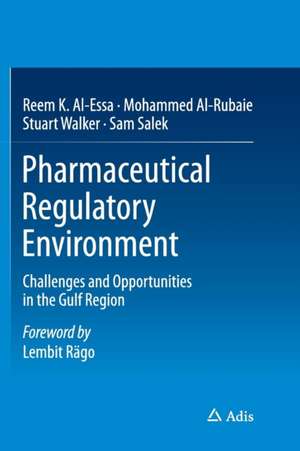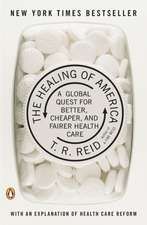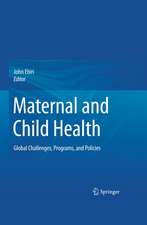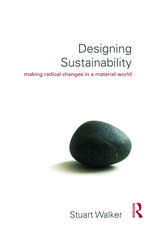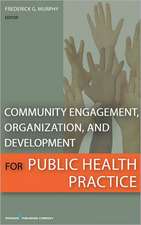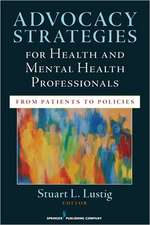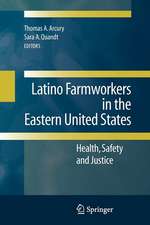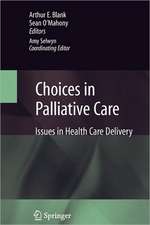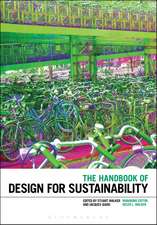Pharmaceutical Regulatory Environment: Challenges and Opportunities in the Gulf Region
Autor Reem K. Al-Essa, Mohammed Al-Rubaie, Stuart Walker, Sam Saleken Limba Engleză Paperback – 8 oct 2016
The Persian Gulf represents the next growth market for the global biopharmaceutical industry but to date there has been limited information about the regulatory review processes employed in these countries. A thorough examination of the strategies currently being implemented by the Gulf States is considered critical to the future regulatory environment in this region.
Pharmaceutical Regulatory Environment: Challenges & Opportunities in the Gulf Region is a must read for those interested in pharmaceutical regulation in the Gulf region.
| Toate formatele și edițiile | Preț | Express |
|---|---|---|
| Paperback (1) | 366.35 lei 43-57 zile | |
| Springer International Publishing – 8 oct 2016 | 366.35 lei 43-57 zile | |
| Hardback (1) | 373.33 lei 43-57 zile | |
| Springer International Publishing – 20 mai 2015 | 373.33 lei 43-57 zile |
Preț: 366.35 lei
Preț vechi: 385.62 lei
-5% Nou
Puncte Express: 550
Preț estimativ în valută:
70.10€ • 73.38$ • 58.35£
70.10€ • 73.38$ • 58.35£
Carte tipărită la comandă
Livrare economică 31 martie-14 aprilie
Preluare comenzi: 021 569.72.76
Specificații
ISBN-13: 9783319360102
ISBN-10: 3319360108
Pagini: 249
Ilustrații: XIII, 236 p. 79 illus. in color.
Dimensiuni: 155 x 235 x 13 mm
Greutate: 0.36 kg
Ediția:Softcover reprint of the original 1st ed. 2015
Editura: Springer International Publishing
Colecția Adis
Locul publicării:Cham, Switzerland
ISBN-10: 3319360108
Pagini: 249
Ilustrații: XIII, 236 p. 79 illus. in color.
Dimensiuni: 155 x 235 x 13 mm
Greutate: 0.36 kg
Ediția:Softcover reprint of the original 1st ed. 2015
Editura: Springer International Publishing
Colecția Adis
Locul publicării:Cham, Switzerland
Cuprins
1. Overview of Medicines Regulatory Systems in the Gulf Region.- 2. The Regulatory Review Process in the Gulf Region.- 3. Regulatory Review Times in the Gulf Region.- 4. Quality Measures in the Gulf Regulatory Practices.- 5. The Current Status of the Common Technical Document.- 6. The Current Status of Drug Safety and Pharmacovigilance.- 7. The Centralized Regulatory Review in the Gulf Region.- 8. The Gulf States Assessment and Experience With the Centralised Procedure.- 9. The Pharmaceutical Companies Assessment and Experience With the Centralised Procedure.- 10. Proposal For an Improved Centralized Regulatory System.- 11. The Strategic Planning Process of the GCC Regulatory Authorities: Barriers And Solutions.- 12. The Regulatory Dilemma in the Gulf Region: The Way Forward.
Notă biografică
Reem Al-Essa BPharm MSc PhD was the Drug Registration and Release Superintendent for six years of her 12 years experience with Ministry of Health, Kuwait. During this period she completed her MBA with distinction. She later undertook the EU2P MSc in Pharmacovigilance and Pharmacoepidemiology. Dr Al-Essa has published six journal articles and abstracts related to pharmaceutical regulation in the Gulf region.
Mohammed Hamdan Al-Rubaie BPharm MSc PhD is the Director of Drug Control, Directorate General of Pharmaceutical affairs and Drug Control, Oman Ministry of Health.He is a member of the GCC Central Registration Committee, and actively involved in many other GCC committees and working groups for the drafting of the GCC pharmaceutical regulations and policies. Dr Al-Rubaie was instrumental in forming the Pharmaceutical society in Oman and chaired it from 2010-2011.Stuart Walker BSc, PhD, MFPM FRSC FIBiol, FRCPath, is the Founder of the Centre for Medicines Research International, the Centre for Innovation in Regulatory Science and Professor of Pharmaceutical Medicine, University of Wales, Cardiff. During his research career in academia & industry, he has supervised many PhD programmes in clinical development, regulatory policies, the benefit/risk assessment of medicines and health technology assessment, co-authored 280 research papers and edited 25 books. He is frequently involved in the organisation of international meetings on key issues that concern the regulatory review of medicines and has lectured extensively throughout Europe, the USA, the Asia-Pacific Region, Latin America and the Middle East.
Sam Salek PhD RPh FFPM MRPSGB MCMS FESCP is Professor of Pharmacoepidemiology at the University of Hertfordshire, Hatfield, visiting Professor at the Estate of Hessen, Germany, and Director of the Institute for Medicines Development, Cardiff, UK. Professor Salek’s research focuses mainly on four areas: development and application of patient-reported outcome measures; drug safety evaluation and pharmacovigilance; pharmacoeconomics and economic evaluation of healthcare; and pharmaceutical regulation & medicines development in the mature and emerging markets. He has published 19 books and 600 journal articles and abstracts. Professor Salek is a member of five Editorial Boards and an active member of several societies.
Mohammed Hamdan Al-Rubaie BPharm MSc PhD is the Director of Drug Control, Directorate General of Pharmaceutical affairs and Drug Control, Oman Ministry of Health.He is a member of the GCC Central Registration Committee, and actively involved in many other GCC committees and working groups for the drafting of the GCC pharmaceutical regulations and policies. Dr Al-Rubaie was instrumental in forming the Pharmaceutical society in Oman and chaired it from 2010-2011.Stuart Walker BSc, PhD, MFPM FRSC FIBiol, FRCPath, is the Founder of the Centre for Medicines Research International, the Centre for Innovation in Regulatory Science and Professor of Pharmaceutical Medicine, University of Wales, Cardiff. During his research career in academia & industry, he has supervised many PhD programmes in clinical development, regulatory policies, the benefit/risk assessment of medicines and health technology assessment, co-authored 280 research papers and edited 25 books. He is frequently involved in the organisation of international meetings on key issues that concern the regulatory review of medicines and has lectured extensively throughout Europe, the USA, the Asia-Pacific Region, Latin America and the Middle East.
Sam Salek PhD RPh FFPM MRPSGB MCMS FESCP is Professor of Pharmacoepidemiology at the University of Hertfordshire, Hatfield, visiting Professor at the Estate of Hessen, Germany, and Director of the Institute for Medicines Development, Cardiff, UK. Professor Salek’s research focuses mainly on four areas: development and application of patient-reported outcome measures; drug safety evaluation and pharmacovigilance; pharmacoeconomics and economic evaluation of healthcare; and pharmaceutical regulation & medicines development in the mature and emerging markets. He has published 19 books and 600 journal articles and abstracts. Professor Salek is a member of five Editorial Boards and an active member of several societies.
Textul de pe ultima copertă
The Middle East represents the next growth market for the global biopharmaceutical industry but to date there has been limited information about the regulatory review processes employed in these countries. A thorough examination of the strategies currently being implemented by the Gulf States is considered critical to the future regulatory environment in this region.
This book compares national and centralised procedure practices and key performance metrics, including current approval times, review practices and pharmacovigilance standards, in the seven Gulf States. Opportunities for an improved regulatory system are identified, which, if fully implemented, could have a significant impact on patients’ access to new medicines.
Pharmaceutical Regulatory Environment: Challenges & Opportunities in the Gulf Region is a must read for those interested in pharmaceutical regulation in the Gulf region.
This book compares national and centralised procedure practices and key performance metrics, including current approval times, review practices and pharmacovigilance standards, in the seven Gulf States. Opportunities for an improved regulatory system are identified, which, if fully implemented, could have a significant impact on patients’ access to new medicines.
Pharmaceutical Regulatory Environment: Challenges & Opportunities in the Gulf Region is a must read for those interested in pharmaceutical regulation in the Gulf region.
Caracteristici
Examines the regulatory review practices in the seven Gulf Cooperation Council states, namely Kuwait, Iraq, Bahrain, Oman, Qatar, Saudi Arabia and the United Arab Emirates
Compares national metrics with those of the harmonised centralised review procedure, for companies wishing to gain market approval for new drugs in the region
Describes the current strategies and future opportunities for an improved regulatory environment in the Gulf region
Compares national metrics with those of the harmonised centralised review procedure, for companies wishing to gain market approval for new drugs in the region
Describes the current strategies and future opportunities for an improved regulatory environment in the Gulf region
